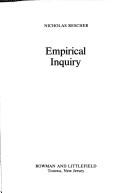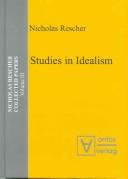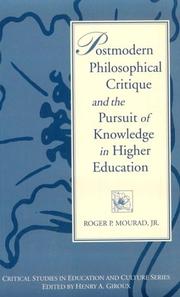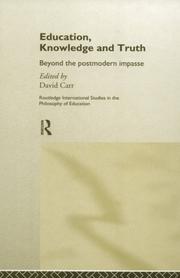| Listing 1 - 10 of 35 | << page >> |
Sort by
|

ISBN: 0847670279 Year: 1982 Publisher: Totowa Rowman & Littlefield
Abstract | Keywords | Export | Availability | Bookmark
 Loading...
Loading...Choose an application
- Reference Manager
- EndNote
- RefWorks (Direct export to RefWorks)

ISBN: 3110326329 9783110326321 9783937202815 3937202811 3110325373 9783110325379 3937202811 9783110325379 Year: 2005 Volume: 4 Publisher: Frankfurt ; New Brunswick : Ontos Verlag,
Abstract | Keywords | Export | Availability | Bookmark
 Loading...
Loading...Choose an application
- Reference Manager
- EndNote
- RefWorks (Direct export to RefWorks)
set of studies of various central problems in contemporary philosophy--particularly issues relating to the theory of knowledge and to philosophical inquiry itself (metaphilosophy).
Book
ISBN: 9780521193979 9781139047982 Year: 2021 Publisher: Cambridge Cambridge University Press
Abstract | Keywords | Export | Availability | Bookmark
 Loading...
Loading...Choose an application
- Reference Manager
- EndNote
- RefWorks (Direct export to RefWorks)
Aristotle is a rarity in the history of philosophy and science - he is a towering figure in the history of both disciplines. Moreover, he devoted a great deal of philosophical attention to the nature of scientific knowledge. How then do his philosophical reflections on scientific knowledge impact his actual scientific inquiries? In this book James Lennox sets out to answer this question. He argues that Aristotle has a richly normative view of scientific inquiry, and that those norms are of two kinds: a general, question-guided framework applicable to all scientific inquiries, and domain-specific norms reflecting differences in the target of inquiry and in the means of observation available to researchers. To see these norms of inquiry in action, the second half of this book examines Aristotle's investigations of animals, the soul, material compounds, the motions of heavenly bodies, and respiration.
Inquiry (Theory of knowledge) --- Aristotle. --- Science --- Philosophy.
Book
ISBN: 1805113968 1805113941 9781805113966 Year: 2024 Publisher: Cambridge, UK : Open Book Publishers,
Abstract | Keywords | Export | Availability | Bookmark
 Loading...
Loading...Choose an application
- Reference Manager
- EndNote
- RefWorks (Direct export to RefWorks)
Book
ISBN: 9780198705604 0198705603 0191774502 Year: 2014 Publisher: Oxford: Oxford university press,
Abstract | Keywords | Export | Availability | Bookmark
 Loading...
Loading...Choose an application
- Reference Manager
- EndNote
- RefWorks (Direct export to RefWorks)
Long before science as we know it today existed, sophisticated studies of the external world were undertaken, notably in Mesopotamia, India, China, and Greece. G. E. R. Lloyd explores three interrelated issues concerning those investigations. This first issue is methods--how was it thought that they should be pursued? The second is subject-matter--what was assumed about what there is to be investigated? The third issue is aims and value--what were such investigations thought to be good for? Thus how did an ideal of demonstration that would yield incontrovertible conclusions come to arise and what did it owe to the political institutions of the society in which it first developed, namely ancient Greece? Debate has been widely practised and not just in literate societies: Lloyd's second chapter draws up a taxonomy of ancient debates and discusses how the ideals of transparency and accountability were made explicit. Then how did ideas about the need to undertake systematic research come to be formulated and such research practised, and what obstacles did it face? Different equally valid assumptions have been made about what there is to be investigated, reflecting what is here called the multidimensionality of the phenomena, and different ancient investigators entertained different aims for their work, mirroring but sometimes going beyond the current values of their society. Taking stock of all this diversity, the final chapter spells out the implications for our understanding of the history of human reasoning in general, exploring its commonalities and where and why it has manifested and continues to manifest specificities across different populations.
Philosophy, Ancient --- Inquiry (Theory of knowledge) --- Philosophy --- History --- Philosophy, Ancient. --- Inquiry (Theory of knowledge). --- History. --- history. --- Inquiry (Theory of knowledge) - History --- Inquiry (Theory of knowledge) - Cross-cultural studies --- Philosophy - History
Book
ISBN: 9780367204235 0367204231 Year: 2018 Publisher: London Routledge
Abstract | Keywords | Export | Availability | Bookmark
 Loading...
Loading...Choose an application
- Reference Manager
- EndNote
- RefWorks (Direct export to RefWorks)
In close collaboration with the late Matthew Lipman, Ann Margaret Sharp pioneered the theory and practice of ‘the community of philosophical inquiry’ (CPI) as a way of practicing ‘Philosophy for Children’ and prepared thousands of philosophers and teachers throughout the world in this practice. In Community of Inquiry with Ann Margaret Sharp represents a long-awaited and much-needed anthology of Sharp’s insightful and influential scholarship, bringing her enduring legacy to new generations of academics, postgraduate students and researchers in the fields of education, philosophy, philosophy of education, Philosophy for Children and philosophy of childhood. Sharp developed a unique perspective on the interdependence of education, philosophy, personhood and community that remains influential in many parts of the world. This perspective was shaped not only by Sharp’s work in philosophy and education, but also by her avid studies in literature, feminism, aesthetic theory and ecumenical spirituality. Containing valuable contributions from senior figures in the fields in which Sharp produced her most focused scholarship, the chapters in this book present a critical overview of how Sharp’s ideas relate to education, philosophy of education, and the Philosophy for Children movement as a whole. (Provided by publisher)
Inquiry (Theory of knowledge) --- Inquiry-based learning --- Sharp, Ann Margaret,
Book
ISBN: 9789173466035 Year: 2007 Publisher: Götheborg : Acta Universitatis Gothoburgensis,
Abstract | Keywords | Export | Availability | Bookmark
 Loading...
Loading...Choose an application
- Reference Manager
- EndNote
- RefWorks (Direct export to RefWorks)
Inquiry (Theory of knowledge) --- Knowledge, Theory of --- Epistemology --- Theory of knowledge --- Philosophy --- Psychology --- Methodology
Book
ISBN: 1785276999 1785276980 1785277006 Year: 2021 Publisher: New York, New York State : Anthem Press,
Abstract | Keywords | Export | Availability | Bookmark
 Loading...
Loading...Choose an application
- Reference Manager
- EndNote
- RefWorks (Direct export to RefWorks)
The book is a study of the evolving history of knowledge in the arts and sciences in the modern era - from 1648 through the present. Modernism is treated as an epoch with evolving disciplines whose articulated problems of a time and the inquiry methods to address them, develop in a coordinated manner, given a mutual awareness. When one organizes the development of knowledge over periods of years, and gives it an appellation such as 'Modernism,' the organization of facts is guided by concepts and values discerned throughout these periods. These facts of knowledge development share sufficient understandings to be called an 'era,' or an 'epoch,' or other terms that insist on the shared aspects of those years. One can call such an effort a 'metahistory,' in that what is tracked is not merely a knowledge that is political, economic, ideological, sociological, or scientific, but an overview that tracks the respective conceptual developments of the fields in how they have changed and augmented their problem formulations, inquiry methods, and explanatory conceptions over time.
Civilization, Modern --- Historiography. --- Inquiry (Theory of knowledge) --- Knowledge, Theory of --- Modern civilization --- Modernity --- Civilization --- Renaissance --- History

ISBN: 089789488X Year: 1997 Publisher: Westport (Conn.): Bergin and Garvey
Abstract | Keywords | Export | Availability | Bookmark
 Loading...
Loading...Choose an application
- Reference Manager
- EndNote
- RefWorks (Direct export to RefWorks)
Education, Higher --- Inquiry (Theory of knowledge) --- Postmodernism and higher education --- Research --- Philosophy

ISBN: 041516317X Year: 1998 Publisher: London Routledge
Abstract | Keywords | Export | Availability | Bookmark
 Loading...
Loading...Choose an application
- Reference Manager
- EndNote
- RefWorks (Direct export to RefWorks)
Curriculum planning --- Education --- Inquiry (Theory of knowledge) --- Knowledge, Theory of --- Postmodernism and education --- Truth --- Philosophy
| Listing 1 - 10 of 35 | << page >> |
Sort by
|

 Search
Search Feedback
Feedback About UniCat
About UniCat  Help
Help News
News